Mini-challenge
-
Here's another variant... OK, it's NOT 100% accurate... but near enough... AND the rail's cross-section is exact, with only the length slightly off ~0.02mm...
-
has anyone tried these solutions that are so so close by modeling them 10x or 100x their scale? will sketchup perform that angle alignment better when the distance between the 2 points is greater? is this a case of sketchup not real great at really really small geometry?
-
@bmike said:
has anyone tried these solutions that are so so close by modeling them 10x or 100x their scale? will sketchup perform that angle alignment better when the distance between the 2 points is greater? is this a case of sketchup not real great at really really small geometry?
If you use my latest method after you scale x100, then scale down x0.01 the length 'error' is x10 less - ~0.002mm rather than ~0.02mm - an improvement but not that significant as it was already negligible !

-
@tig said:
@bmike said:
has anyone tried these solutions that are so so close by modeling them 10x or 100x their scale? will sketchup perform that angle alignment better when the distance between the 2 points is greater? is this a case of sketchup not real great at really really small geometry?
If you use my latest method after you scale x100, then scale down x0.01 the length 'error' is x10 less - ~0.002mm rather than ~0.02mm - an improvement but not that significant as it was already negligible !

so its not a problem of sketch up working really small or really large (like other things) - but just a general inability to snap / reference correctly? is that the consensus?
-
Also SketchUp merges very close endpoints.
-
Hi again,
I did not read all the posts, but here would be my 'manual' method with just SU tools.
This is derived from the mathematical solution, but for the geometric construction, the caveat is that circles in Sketchup are made of segments, so that their intersection is never perfectly accurate. So, I use here circles with 256 segments which seems good enough.
The method just helps drawing the guide for teh rotation. So it is independent of the shape of the board.
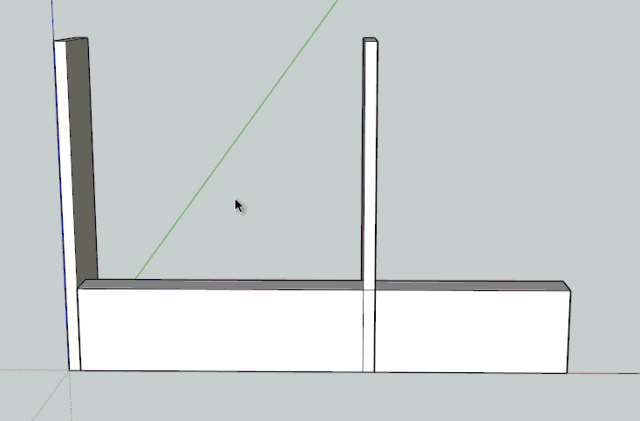
Fredo
PS: the offset angle is equal to arc sinus (width of board / length of diagonal)
-
@bmike said:
so its not a problem of sketch up working really small or really large (like other things) - but just a general inability to snap / reference correctly? is that the consensus?
the problem isn't about scale.. and not necessarily about poor snapping ability (in general) as sketchup's inferencing is actually very good.. only when rotating does this problem rear it's ugly head..
here's an example which shows the problem more effectively..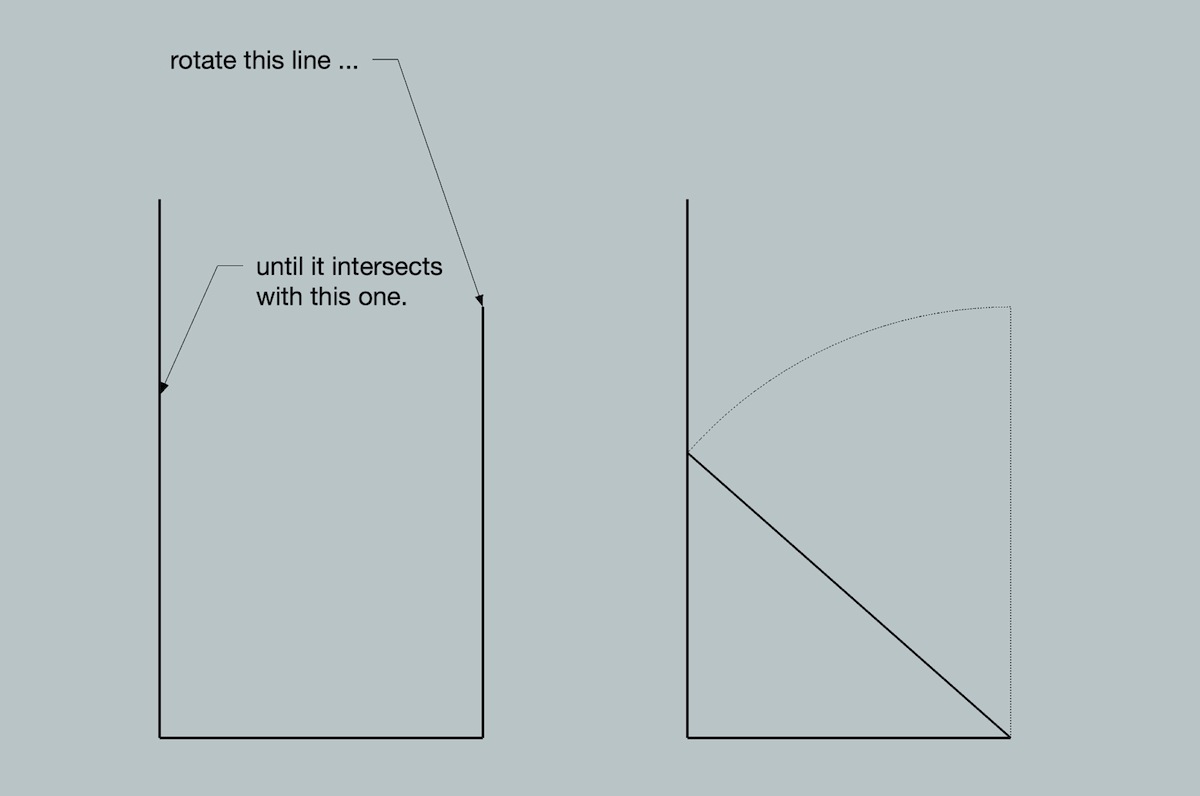
if you try this scenario, you'll see sketchup basically ignores the vertical line that you need to snap to..
[edit].. and in this circumstance, there are a couple of workarounds.. some of which are being shown in this thread.. there's the brute force method in which you draw an arc with a very high amount of segments in order to obtain an intersect point.. you could use TIG's true tangents to obtain a snap point.. you could use a calculator (or DC) to find a rotation angle or height along the vertical line to snap to..
the challenge, in this scenario, is to find a geometrical relationship which would allow you to use only sketchup tools to obtain an absolute snap.. if you could figure that out, then it could (probably) also be applied to the original scenario in this thread. (and actually, it doesn't have to be sketchup tools.. more like -- if you can find a geometrical relationship which doesn't involve using a compass, then there will be a way to draw this accurately in sketchup)
-
-
-
@unknownuser said:
I took one more stab at it...........hopefully more worthy than my first attempt.
Please see attached SKP's
Charlie
hey Charlie.. that's gilles' second (i think second) solution.. it does get it very very close and to me, it's acceptably close since i'll be working in inches like you.. if you tried that while working in metric with the highest precision setting allowed in sketchup then the error would show up..
basically, you rotate the end to 90º which is fine and what needs to happen.. however, when you rotate the other end to 90º it throws off the first end's 90º..
-
@unknownuser said:
@unknownuser said:
I took one more stab at it...........hopefully more worthy than my first attempt.
Please see attached SKP's
Charlie
hey Charlie.. that's gilles' second (i think second) solution.. it does get it very very close and to me, it's acceptably close since i'll be working in inches like you.. if you tried that while working in metric with the highest precision setting allowed in sketchup then the error would show up..
basically, you rotate the end to 90º which is fine and what needs to happen.. however, when you rotate the other end to 90º it throws off the first end's 90º..
Apologies to Gilles
 ..............somehow I missed that.......I now see it on pg 7....
..............somehow I missed that.......I now see it on pg 7.... 
And thanks Jeff for pointing that out.
Charlie
-
Be my guest.
-
Oh, and Jeff...........thanks for binging this to light.
A few months ago I was working on a Zipline project.......and making all the X bracing was making me nuts.
I was "brute forcing it" as you say. (see attached)
Charlie
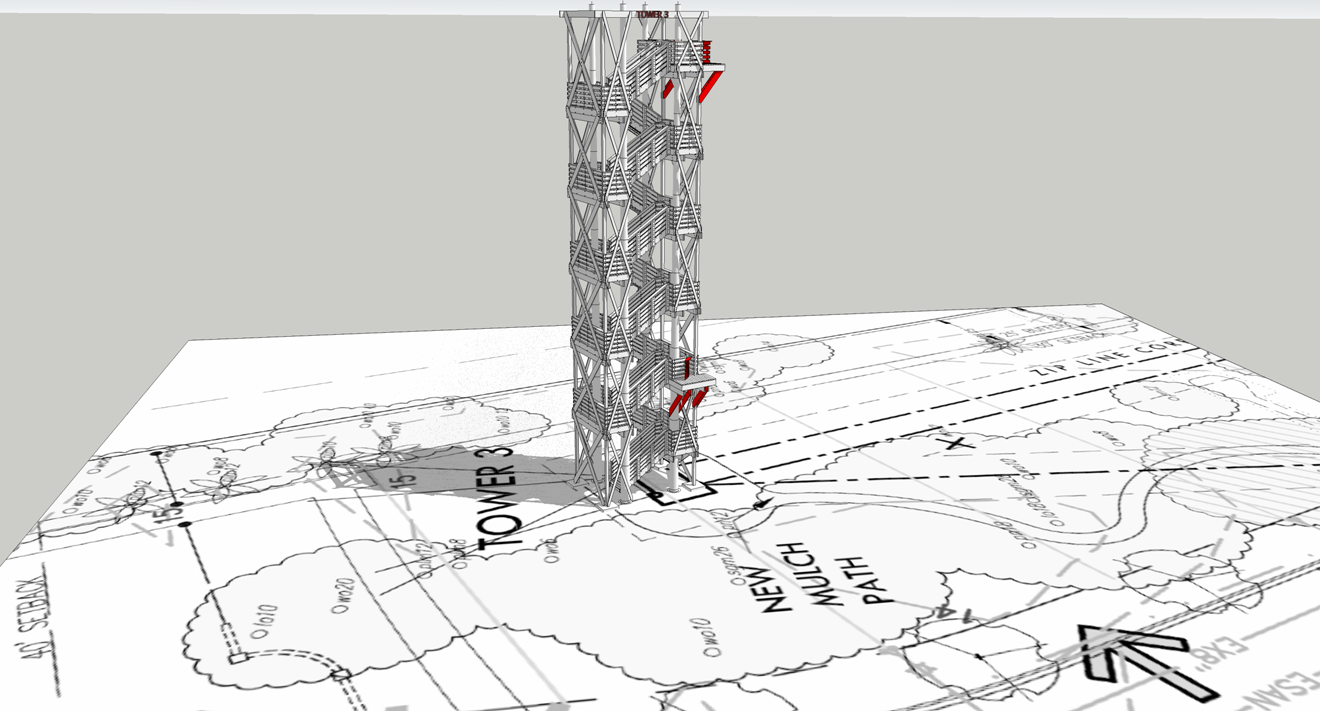
-
@unknownuser said:
Oh, and Jeff...........thanks for binging this to light.
A few months ago I was working on a Zipline project.......and making all the X bracing was making me nuts.
I was "brute forcing it" as you say. (see attached)
Charlie
wow!.. that's a perfect drawing to show to the developers as a case for why this needs to be fixed in sketchup..

[edit] and really? you're building ziplines that high? looks fun.

-
The last Fredo method (some simple indeed) without plug gives with apparently no problem of top tangency vertices

1.3239127 Nurbs (height of brace cut vertically) Pilars are 1 * 1 * 10 , brace 1 * 1 * x : unity meter
1.323908 SU13.2391273 Nurbs (length of brace between the pilars)
13.239127 SU14.1421356 Nurbs diagonal
14.142136 Su
Does this acceptable ? Accurate or not?
PS
(i don't reload the Fredo's file due V8 against V6 So remake my own version of Fredo's Method!
So remake my own version of Fredo's Method! 
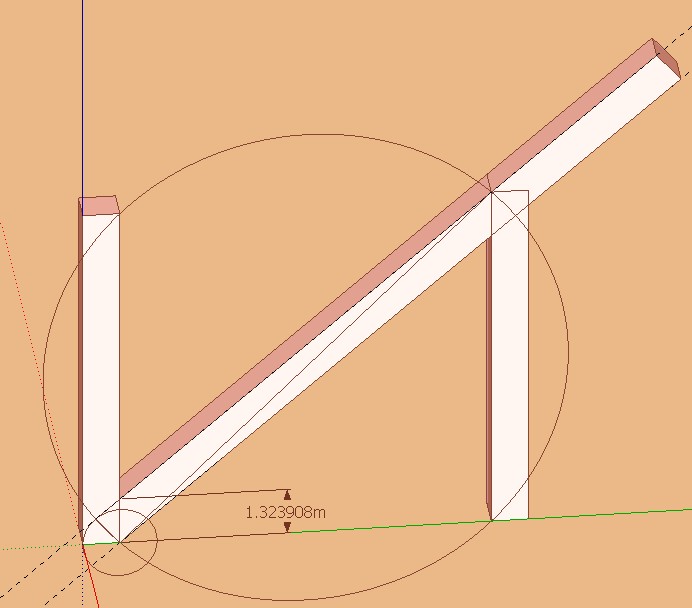
-
@unknownuser said:

[edit] and really? you're building ziplines that high? looks fun.

Jeff,
I composed a longer/detailed reply...........but? I got timed out I guess.So, in short........yes........towers for the ZL are high here (~90' AFG)..because the grade is relatively flat like pancake. (contours @ 1' intervals are typical).
Attached screenshot depicts my participation in the project. (plan/execute pre assembly components @ grade)...............hoist by crane to place.
Beast,
Charlie
-
@unknownuser said:
The last Fredo method (some simple indeed) without plug gives with apparently no problem of top tangency vertices
Unfortunately, although the method is mathematically correct, it suffers from the lack of precision of Sketchup for rotation and parallelism of guides (even with circles of 512 segments).
One way to check that is to split the right post and the board and check the intersectio. As shown in the video, it may not be clean in certain cases.
So you need an extra step, with the Move tool, to adjust the intersection. You can do this step accurately because the SU Move tools inferences differently the intersection points (cross) and the endpoints (circular dot).
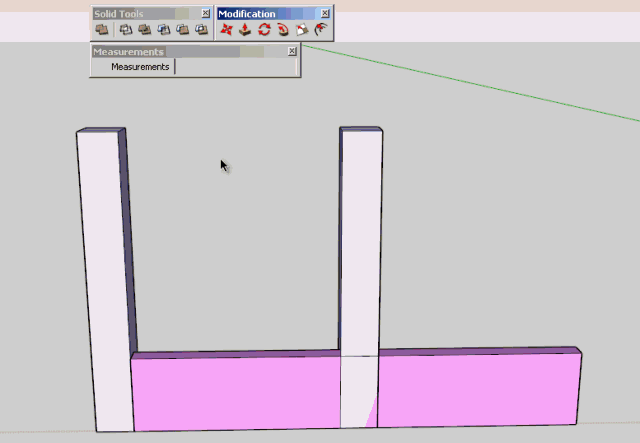
Strangely, Ruby does not suffer this inaccuracy issue and gives a correct intersection, although the FredoScale Rotate script uses the same method (i.e. calculate the offset angle and substract it to the rotation angle).
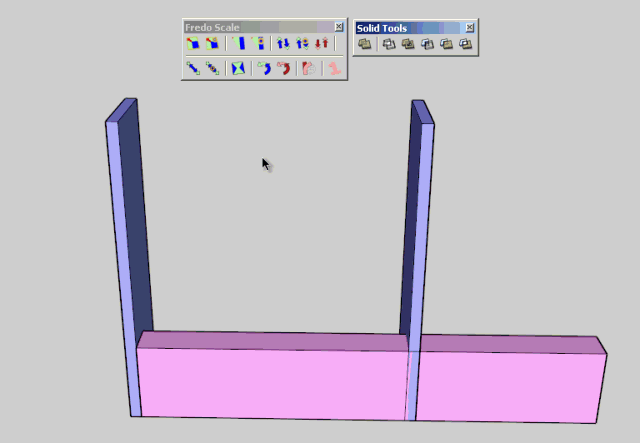
Fredo
-
This mini challenge gave me an interesting idea. Thanks Jeff.
I will introduce an option in FredoScale for the tools using rotation, in particular the Free Rotate tool (but also Twist and Rotate in Box).
Basically, after you define the plan of rotation and base direction, you will click an extra target point anywhere in the model. This target point, and actually the parallel to the base direction passing through this point will be used as inference guide instead of the base direction.As I did not want to make a separate tool, the convention is that when you click the point for the base direction, you release after 1 second (kind of long click). Then you'll have the opportunity to click the target point as a red cross (in the Fee Rotate tool, you can also toggle this function via Ctrl Alone).
Indeed this is a plugin solution to the challenge, but I am not sure there is a pure geometrical solution with just the native standard SU Tools.
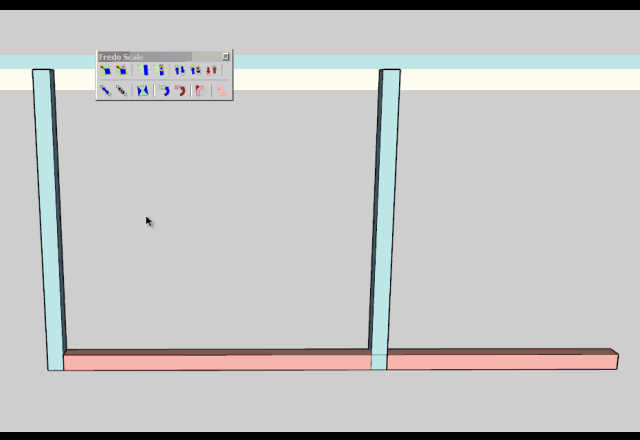
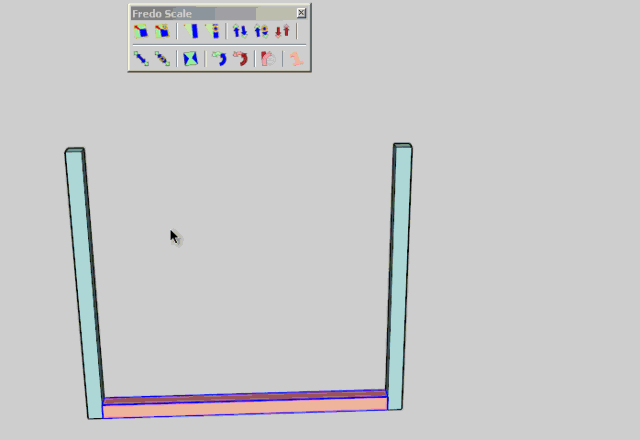
If you wish to try in advance of releasing, just drop the file Lib6Protractor.rb attached to this post into the LIBFREDO6_Dir_44 folder.
Fredo
-
For info, I just published the script updates for supporting the two problems featured in this mini challenge. See this post for detail and video.
This comes in FredoScale, but you just need to download LibFredo6 4.5a.
Fredo
-
You are a crazy man, Fredo!!!!!
Advertisement







